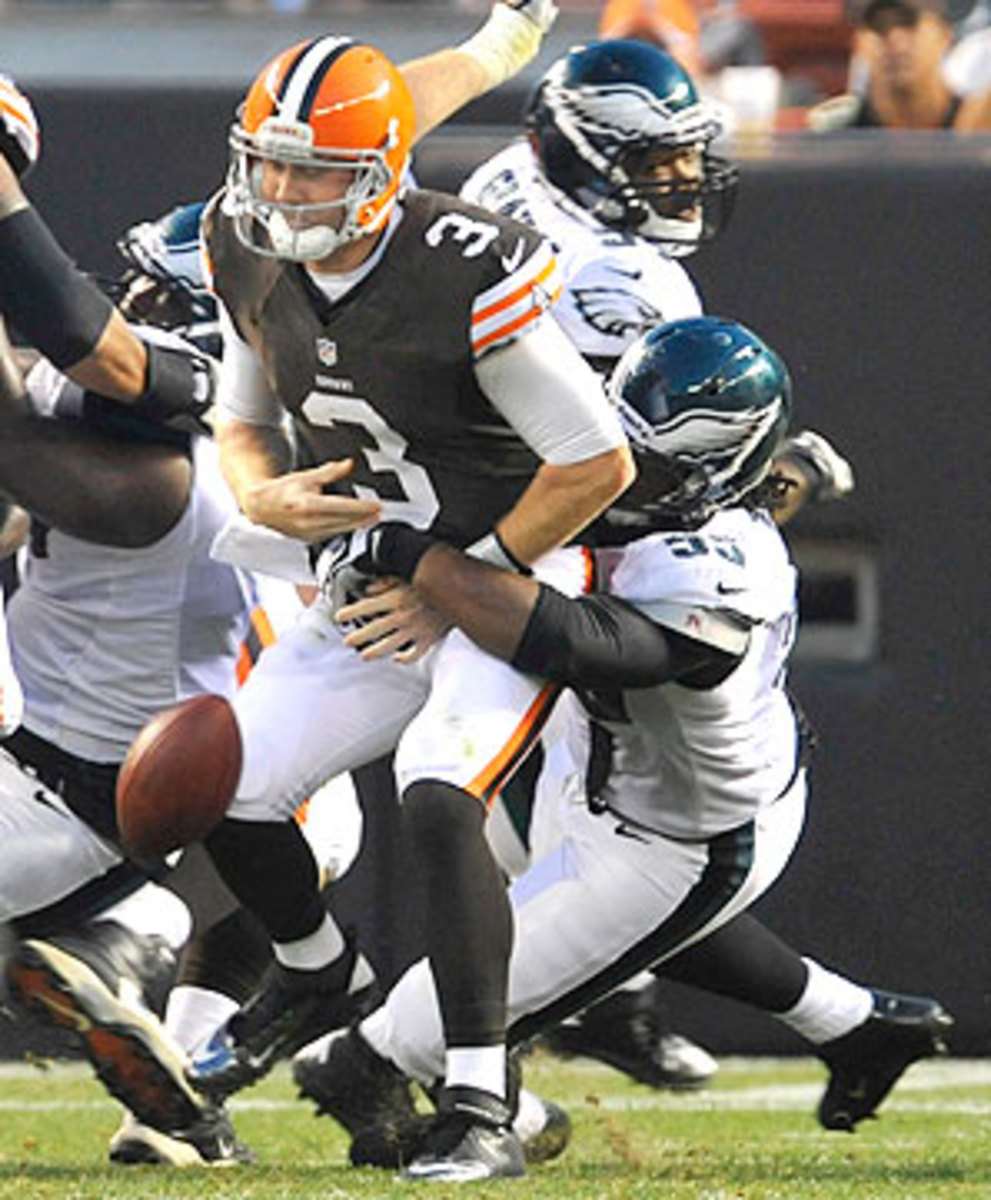
The promise to get better is required no matter win or lose
There was a neatly symbolic moment before the Browns played the Eagles on Sunday, when Cleveland's rookie quarterback Brandon Weeden became trapped under a gigantic American flag being pulled across the gridiron like a warm blanket fresh from the dryer (which is sort of what it feels like when football returns after a seven-month absence).
Though the NFL is America's game, and its logo a shield-shaped Old Glory, this was the first time in memory that one of its players was so wrapped up in the flag that he disappeared entirely beneath the stars and stripes, and appeared to be lost forever.
When Weeden eventually surfaced, and played poorly in the Browns' 17-16 loss, he became even more emblematic of America than he had been under America's emblem. For he was, postgame, what every one of us strives to be: a vessel of self-improvement.
"Brandon Weeden is our starter," said his coach, Pat Shurmur, before uttering the most frequently spoken sentiment in sports, "He's going to get better."
Getting better, being better, doing better: It's the public mantra after every NFL game. Michael Vick, the quarterback of the team that beat the Browns on Sunday, was no more self-satisfied for having won. "We'll go back to the drawing board," he said, "look at film and get better."
Such promises are required of losing teams. ("The entire team needs to look themselves in the eye, look in the mirror and say, 'What can I do better?'" Saints interim coach Aaron Kromer said Sunday.) But it's now every bit as customary for winning teams to declare themselves not nearly good enough, and to vow improvement in the days ahead.
"We have to do better," Vikings defensive end Jared Allen said after his team's win over Jacksonville on Sunday.
"It will only get better," Pats guard Logan Mankins said after New England beat the Titans, whose own promises of self-improvement almost went without saying. (But they were said: They have to be.) "We all know that the running game has to get better," Titans coach Mike Munchak said.
We all know that because constant improvement has been preached in our culture from the very beginning. We don't necessarily need to get better every day -- on the contrary, that's impractical and probably impossible -- but we do need to appear as if we want to get better every day.
Benjamin Franklin recognized this. In the interest of self-improvement, 20-year-old Franklin concentrated on living 13 daily "virtues", ranging from frugality to sincerity. The list originally featured just a dozen honorable qualities, until a friend added "humility". "I cannot boast of much Success in acquiring the Reality of this Virtue," Franklin wrote half a century later. "But I had a good deal with regard to the Appearance of it."
Many who worship at the church of self-help -- Our Lady of Perpetual Improvement -- do so knowing that their new diet, or exercise regimen, or that list of Great Books magnetized to the fridge, will likely let them down. But the conspicuous pursuit of self-betterment -- the Appearance of virtue, in Franklin's words -- remains their duty as citizens. "Building a better you," writes the self-help guru Zig Ziglar, "is the first step to building a better America."
And so most of us "keep going, keep working, try to get better," as 49ers running back Frank Gore promised to do on Sunday, after his team's victory over the Packers. We strive -- as parents and students and workers -- to "progress each week and get better," as Colts tight end Coby Fleener said after his team's loss to the Bears the same day.
This sentiment is the mother's milk of motivational speakers and self-help authors, of life coaches and football coaches (and is there any difference between the two anymore?). To stop improving -- or at least to stop claiming a desire to improve -- is a kind of death.
"You always feel like you're either getting better or you're getting worse," 49ers coach Jim Harbaugh said after his team's win on Sunday. "You never stay the same. We've talked a lot about that."
It is perhaps needless to say that 29 of the 30 teams in the NFL will not improve sufficiently to win the Super Bowl this season, or any other season. Some teams will inevitably get worse as this year goes on. Such is the human condition. If you finished even one of those Great Books from the list on your fridge, you might have made it to the last line in Gatsby: "So we beat on, boats against the current, borne back ceaselessly..."
But we keep paddling anyway, even if just to stand still. And maybe one day, in the interest of self-improvement, we'll slog through Worstward Ho, a Samuel Beckett novella, with its own great line on all this: "Ever tried. Ever failed. No matter. Try again. Fail again. Fail better."





